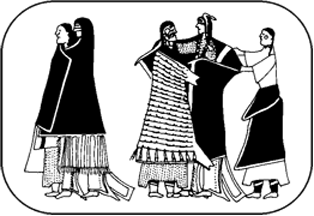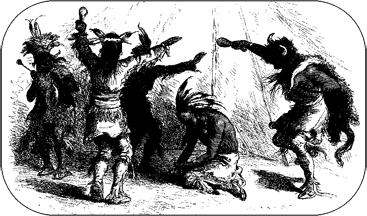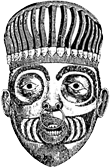
Andrew Larsen
Prax is an arid steppe to the east of Sartar. In the beginning it was a lush and fertile region known as Genertís Garden, but in the Great Darkness, all the plants began to die and there was not enough food. The great spirit Waha declared that some must eat plants and the rest would eat the plant eaters. To decide which, all the residents of Prax played knucklebones. In most cases the humans won and the herd animals were obliged to eat plants and be eaten in return, but in one game, the Morokanth won and so their humans eat plants and are eaten in return.

Prax today is a dry region, with only one river that lasts all year (the Zola Fel, or River of Cradles). Most of the land is too dry to accept agriculture, although small oases dot the region, in which some farming does take place. A few permanent communities exist along the River of the Cradles and at the oases, but most of Prax is only inhabited by the Animal Nomads. Despite the dryness of the land, Prax can be quite stormy, especially during the Winter Fertile season, when a good deal of rain falls and dry rivers (called the Serpents) briefly revive. The region varies in temperature with Summer growing as hot as 110 degrees during the day and 65 degrees at night and Winter being as cold as 45 degrees during the day and 15 degrees at night. Dust storms are common during Summer
The Animal Nomads fall into the Major and Minor tribes. The Major tribes are the Bison, Impala, Sable, and High Llama riders and the Morokanth; these tribes are comparatively numerous, divided into many clans who continuously move about the steppe. The Minor tribes are the Rhino, Bolo Lizard, Ostrich, Zebra, and Unicorn riders; these tribes are much smaller in number, possessing only a few clans. The Bolo Lizard, Ostrich, and Unicorn riders represent significant variances from normal Praxian patterns religiously. There are a few other nomadic peoples, such as the Agimori (or Men-and-a-Half), the Pol Joni, and the Cannibal cultists (who mistakenly thought that Waha commanded them to eat other people).
The Major tribes are divided into clans, and the clans are composed of septs, loosely structured around family groups. Each sept has a sept-khan, from whose number the clan-khan is usually chosen. In turn, the clan-khans choose one of their number to be the High Khan of the tribe. The khans are responsible for the defense of their people and their enrichment through raiding. Equally important are the priestesses of Eiritha, the Mother of Herds. The herds are critical to survival in Prax and represent the major wealth of the people; it is the job of the priestesses to ensure the health and well-being of the herds and the people. Each sept or clan priestess controls decisions involving the herds, including when (and where) the herds must move.

Praxian society is fairly rigid, a need imposed on them by the harsh conditions of Prax. Men are understood to wield the power of death, while women wield the power of life. Men are the warriors and hunters, while women are the herders and artisans, although a tiny number of women fight. Both deal with spirits as shamans.
Praxian Social Patterns
The following discusses the general way that Praxian tribes are organized, but there is considerable variation on many points from one tribe to another. In particular, the Morokanth deviate on many points from the human clans. The Lesser tribes also differ substantially from the Major tribes.
A Praxian man may marry as soon as he has passed his adulthood rites, but typically a man spends a period as a bachelor, living in the bachelorís tent. Bachelor men see themselves in competition for any women available for marriage, and are likely to engage in mock brawling, athletic competitions, and actual fights whenever there are potential wives around. Wrestling is a particularly important sport, in imitation of Waha; gambling with knucklebones is also common. Women in turn dance in the presence of bachelors to win attention and courtship from them. Ultimately, a man must win the favor of a potential wife and her parents, since the wife has final say, although parents are traditionally consulted and their advice normally taken. Under normal circumstances, a girl lives in her motherís tent until she marries for the first time.
Praxian marriage and family customs are strongly imitative of the reproductive patterns of Praxian herds. A man is permitted to take as many wives as he can protect. All children are equally his regardless of which wife bears the child; although Praxians know who their mother is, all of a manís wives are responsible for the children jointly and children are expected to respect all their fatherís wives. (The Praxian language actually has multiple words for mother, including ďMother-who-bore-meĒ, ďMother-who wed-my-fatherĒ and ďMother-who nurtures-meĒ; this last can refer to any woman who nurses a child, any woman who tends his wounds, any animal whose milk he drinks, and the goddess Eiritha.) Consequently there is comparatively little conflict between wives over children, although favoritism does occur.
A bachelor is permitted to challenge a married man for the right to court his wife. This challenge normally takes the form of a fight or wrestling match, but in some clans may also take the form of a non-violent contest. If the interloping bachelor wins the fight, he is permitted to court the manís wife, who has the right to accept the offer (thereby divorcing her first husband and marrying the suitor) or refuse and remain with her current husband. A woman who is unhappy with her husband will often elicit courtship by dancing before a bachelor, thus signaling her willingness to be courted. Although any man may challenge any married man, in practice most challenges are made by bachelors against men with multiple wives. It is considered an extreme insult to challenge a man who has only one wife. A man who loses his only wife returns to the bachelorís tent, a deep shame.
The primary form of wealth in Praxian society is herd beasts, which are the property of the women of the clan. A man is normally permitted to own only his mount. If he acquires more animals, they are normally gifted to one of his wives or, if he is a bachelor, to a sister or a friend who has no mount; he may reclaim these beasts to offer a dowry. This means that women dominate the economic life of the clan, and men are understood to guard both the women and their wealth.
When a Praxian man reaches adulthood, he received weapons, a mount, and a few other items from his parents, and is expected to enrich himself through fighting and marrying a wealthy wife. A Praxian woman divides her herd beasts equally between her daughters (saving only mounts for her sons, and a share for herself), gifting them to her at marriage. Women represent their wealth publicly by wearing a necklace decorated with one bead for each herd animal they own (or expect to receive at marriage). A poor woman owns 1 animal for each member of her family, while a very wealthy woman owns 10 (this ratio holds for the Llama, Sable, and Morokanth tribes; among the Bison and Impala tribes, the numbers are higher).

Praxian clans are divided into septs, or family units. The size and number of septs in a clan varies considerably, but even a small clan has 5-6 septs. Each sept is united by kinship, so that its members will generally be the children or grandchildren of a common ancestor (usually a man, although among the Sable tribe, matriarchal septs are known). It is possible for a sept to be a single tent, although this is very rare because an isolated family is extremely vulnerable to raiding and other threats. When a man marries, he is gifted by his parents with a new ger (or tent); he will live in this ger with his wives and children (although wealthy families maintain a ger for each wife, with the husband sleeping in whichever ger he chooses, and the children staying in their motherís tent). Men move out of their parentís ger at adulthood and live in the communal bachelorís ger. Septs are exogamous; a man marries a woman from another sept or clan, who then joins his sept. (Marrying a spouse from the same sept is considered mildly incestuous, regardless of the actual blood relationship involved). Septs are free to welcome unrelated members, and it is common for a man from one sept to join the sept of a close friend. Bachelors sometimes leave their sept in hopes of finding wealth elsewhere, but except among the Sable tribe, it is considered effeminate for a man to join his wifeís sept.
Each sept has its own khan, who is normally the oldest male who has attained khan status in his cult. However, any man of khan status is permitted to challenge his sept-khan for leadership; this most commonly happens when the sept-khan is too old or too badly injured to be an effective war leader for the sept. Challenge is sometimes the result of a serious enmity, but not inevitably; an older man may encourage his favored son to challenge him for the khanate. Khanate challenge requires a duel, although either party may yield at any time after being wounded once. A challenger who loses is expected to accept his loss and not challenge the victor for at least one full year; the same is true of the loser, although among the Impala tribe a loser is normally barred from returning to the khanate.
The leader of the sept is therefore normally the father, grandfather, or uncle of most of the men in the clan, and related by blood or marriage to all of the women. Thus, although he is politically the leader of the sept, in practice, his leadership resembles that of a father more than that of an official. Among the Sable tribe, matriarchal septs are ruled by a khanum, who is always the Eiritha priestess of her sept.
Praxians take slaves, most commonly through raiding. All tribes do this, but the Morokanth are especially notorious for it; some Morokanth septs and clans focus their economy of slave-dealing more than herding (although among the Morokanth, the boundary between those two practices can be slightly fuzzy). A man is permitted to use his female slaves as concubines, and many bachelors own a female slave before they marry. Children born to a concubine are considered legitimate and free, but will inevitably be quite poor because they will inherit nothing from their mother. If a man has children by both wives and concubines, the children of his concubines will typically be looked down on, and many leave the sept when they reach adulthood. Female slaves are used for domestic chores, craftwork, and herding (depending on the range of skills they possesses). Male slaves are used for heavy labor and herding. However, because most Praxian men are warriors, and therefore potential threats as slaves, it is normal to kill men in battle and enslave women, although some clans hamstring a defeated man to render him less dangerous, and other clans take men as slaves and sell them as quickly as possible.
Praxian men are understood to wield the forces of Death, while women wield the forces of Life. Most men worship Waha the Butcher, the god of the Praxian way of life; Storm Bull, the Praxian weather god and warrior against chaos; or Foundchild, the Praxian hunter, although a few men are shamans and worship spirits or ancestors more than a specific god. It is the job of men to protect the clan and bring resources into the clan through warfare and hunting. Most women worship Eiritha, the Herd Mother, or less commonly Helpwoman, the goddess of craftwork, although a few are shamans. It is the job of women to manage the domestic resources that the clan depends on for survival. Some men and women worship Daka Fal, the judge of the dead, who helps them contact their ancestors. A small percentage of men and women worship other deities less integral to the Praxian way of life, including Orlanth, Humakt, Chalana Arroy, Issaries, Yelmalio, and Babeester Gor. Among Sable Riders, worshipping the Seven Mothers is common.
 The Khan is nearly always a worshipper of Waha or sometimes Storm Bull; he is responsible for protecting the sept or clan and making it wealthier; he interprets and enforces the Yassa (the laws of Waha). The Eiritha Woman is the oldest or most powerful worshipper of Eiritha; she is responsible for the health and fertility of the herd and the human members of the sept or clan, and has final say on any issue related to them. Thus in practice, the sept or clan is governed by its Khan and its Eiritha Woman working in conjunction; both are considered vital to the survival of the community and neither is seen as superior to the other. Most clans also have a Bone Man (or Woman), a shaman who communicates with the ancestors and gains their aid. The Bone Man typically worships Daka Fal, but in some cases may be a shaman of Waha. The shamanesses of Eiritha are forbidden to deal with the dead directly, although they may worship their ancestors. Instead they mostly interact with fertility, animal, and plant spirits, as well as the various other spirits of Prax.
The Khan is nearly always a worshipper of Waha or sometimes Storm Bull; he is responsible for protecting the sept or clan and making it wealthier; he interprets and enforces the Yassa (the laws of Waha). The Eiritha Woman is the oldest or most powerful worshipper of Eiritha; she is responsible for the health and fertility of the herd and the human members of the sept or clan, and has final say on any issue related to them. Thus in practice, the sept or clan is governed by its Khan and its Eiritha Woman working in conjunction; both are considered vital to the survival of the community and neither is seen as superior to the other. Most clans also have a Bone Man (or Woman), a shaman who communicates with the ancestors and gains their aid. The Bone Man typically worships Daka Fal, but in some cases may be a shaman of Waha. The shamanesses of Eiritha are forbidden to deal with the dead directly, although they may worship their ancestors. Instead they mostly interact with fertility, animal, and plant spirits, as well as the various other spirits of Prax.
Because Praxian life is fairly precarious, Praxians tend to be fairly conservative toward innovation and outside cultures. A Praxian trusts his sept first, others in his clan and tribe second, and other Eiritha tribes third. Those outside the Yassa deserve no trust at all, except the temporary convenience of trade.





